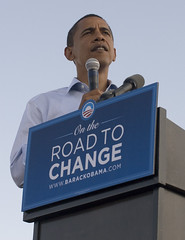 On Saturday December 31st, President Obama signed into law the National Defense Authorization Act for Fiscal Year 2012, which authorizes indefinite military detention without trial of American citizens, among other things. The president's signature was accompanied by a signing statement noting serious reservations, saying "The fact that I support this bill as a whole does not mean I agree with everything in it."
On Saturday December 31st, President Obama signed into law the National Defense Authorization Act for Fiscal Year 2012, which authorizes indefinite military detention without trial of American citizens, among other things. The president's signature was accompanied by a signing statement noting serious reservations, saying "The fact that I support this bill as a whole does not mean I agree with everything in it."
For the moment, let's put aside the horrifying fact that such a bill was even earnestly discussed or advanced in Congress, or that indefinite detention without a trial of anyone is something we're willing to entertain as acceptable. Let's put aside the disturbing practice of folding fundamental changes to U.S. military and legal policy into what are essentially administrative budgeting conversations. And let's pretend that the president didn't sign such a groundbreaking bill on a holiday, a Saturday when most of the country was known to be preoccupied with celebrating the particulars of the Gregorian calendar.
All those things aside, President Obama still signed a bill that he says he disagrees with. That's fine if the bill says that unicorns might exist or that the White House will be painted green; sign it, put it in a file somewhere, work out the details later. But a bill that authorizes the indefinite detention of U.S. citizens without trial seems like it deserves a lot more than the "I don't like it but I guess it's what we have to do" treatment.
President Obama tried to reassure us by saying that his administration won't actually USE these new powers, and that he'll work tirelessly to change the parts that concern him. "My Administration will interpret and implement the provisions described below in a manner that best preserves the flexibility on which our safety depends and upholds the values on which this country was founded."
I don't know about you, but the times we've left the questions of "interpretation" and "implementation" to the preferences of individual leaders seem like the times where we've done the most damage to civil liberties or to a national sense of security about the aspects of "American life" that are core to our identity. In this case, the starting point is that the reckless and dangerous provisions of the Patriot Act from ten years ago have been expanded and then made permanent. Even if Mr. Obama faithfully steers the entire federal government and military-industrial complex to resist taking advantage of these new powers, what happens when the next president decides it's not such a problem to lock up a few people -- FOREVER -- without a trial?
I think the president had on obligation to veto this particular bill.
 It was the one option on the table that would have forced revisiting of the discussion about this ground-shaking change with the urgency and attention it deserved. Now that it's law, we're left with incremental attempts to clarify the language of the bill to hopefully do less harm and court challenges that could take years to get to a Supreme Court that isn't known for its civil libertarian leanings.
It was the one option on the table that would have forced revisiting of the discussion about this ground-shaking change with the urgency and attention it deserved. Now that it's law, we're left with incremental attempts to clarify the language of the bill to hopefully do less harm and court challenges that could take years to get to a Supreme Court that isn't known for its civil libertarian leanings.
Some will say that this is an unsurprising move in a broken political system that already facilitates the amassing of power by a few to the detriment of the ordinary citizen. Others will say that it's not such a big deal and that surely in the end it will mostly be used to legitimately and necessarily fight terrorism. Both of those may be true in some regard.
But for me, it's a new low for the promise that was the Barack Obama presidency. For a man who campaigned on such clear ideals when it came to civil liberties and the role of the U.S. Government in protecting and maintaining them, the signing of the NDAA represents a true lack of integrity that no signing statement or philosophizing about "this is the way the world works" can explain away. There are a lot of wonderful things about the Obama presidency, and there's a lot of good that's been done on his watch. But I can't begin to imagine how, with decisions like this one, the president will make the case to progressive Americans for his re-election.
 I’m a journalist, publisher, software developer and entrepreneur with experience as a founder and organizational leader. Work with me or learn more about me.
I’m a journalist, publisher, software developer and entrepreneur with experience as a founder and organizational leader. Work with me or learn more about me.
I have to agree with you here. At the end of the day, the choice was his to either sign or veto the bill, and he chose to sign it. A huge disappointment, both in his signature and the general inattention of the media to this particular provision. And the U.S. government moves one step closer to trying to replicate the U.S.S.R.
Let me preface this with the disclaimer:
"I did not vote for Obama. I do not think he's OMG THE MOST AWESOMEST PRESIDENT EVARRRR!!!, and overall, I think the NDAA is REALLY REALLY bad news. REALLY bad. Particularly because of its timing w/r/t the OWS stuff going on."
Ok -- with that out of the way.
I would like to point out the irony in the uproar about this by referencing the NDAA bill from 2008, signed by then-president Bush:
http://en.wikipedia.org/wiki/Signing_statement#Controversy_over_George_W._Bush.27s_use_of_signing_statements
"George W. Bush's use of signing statements was and is controversial, both for the number of times employed (estimated at over 750 opinions) and for the apparent attempt to nullify legal restrictions on his actions through claims made in the statements — for example, his signing statement attached to the National Defense Authorization Act for Fiscal Year 2008. Some opponents have said that he in effect uses signing statements as a line-item veto; the Supreme Court had previously ruled such vetoes as unconstitutional in the 1998 case, Clinton v. City of New York."
How can we be critical of a president's use of signing statements (NB I *really* disliked GWB) by declaring that he's using it as a "line item veto" (he did this with over 750 signing statements during his two terms), but then say that those same signing statements on THE SAME BILL are effectively no more than a weak promise to not be a jerk?
I'm pissed that it passed, of course, and yeah, I'm not all that sure that a signing statement is going to stop them from detaining protesters or anyone inconvenient that gets in the way of business-as-usual; but I find this alarmism to be unhelpful and the juxtaposition of opinions, of what a signing statement means *NOW* versus what it meant 3 years ago, to ruffle my feathers a bit.
If the attitude is "give us exactly what we want or we'll stay home" then we'll get President Gingrich. Needless to say, I think Progressive voters will turn out in droves for the President.